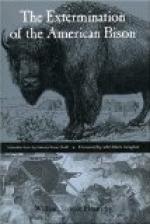[Note 56: Schoolcraft, pp. 101-110.]
[Note 57: Ocean to Ocean, p. 116.]
To afford an idea of the truly military character of those Red River expeditions, I have only to quote a page from Prof. Henry Youle Hind:[58]
[Note 58: Assinniboine and Saskatch. Exp. Exped., II, p. 111.]
“After the start from the settlement has been well made, and all stragglers or tardy hunters have arrived, a great council is held and a president elected. A number of captains are nominated by the president and people jointly. The captains then proceed to appoint their own policemen, the number assigned to each not exceeding ten. Their duties are to see that the laws of the hunt are strictly carried out. In 1840, if a man ran a buffalo without permission before the general hunt began, his saddle and bridle were cut to pieces for the first offense; for the second offense his clothes were cut off his back. At the present day these punishments are changed to a fine of 20 shillings for the first offense. No gun is permitted to be fired when in the buffalo country before the ‘race’ begins. A priest sometimes goes with the hunt, and mass is then celebrated in the open prairies.
“At night the carts are placed in the form of a circle, with the horses and cattle inside the ring, and it is the duty of the captains and their policemen to see that this is rightly done. All laws are proclaimed in camp, and relate to the hunt alone. All camping orders are given by signal, a flag being carried by the guides, who are appointed by election. Each guide has his tarn of one day, and no man can pass a guide on duty without subjecting himself to a fine of 5 shillings. No hunter can leave the camp to return home without permission, and no one is permitted to stir until any animal or property of value supposed to be lost is recovered. The policemen, at the order of their captains, can seize any cart at night-fall and place it where they choose for the public safety, but on the following morning they are compelled to bring it back to the spot from which they moved it the previous evening. This power is very necessary, in order that the horses may not be stampeded by night attacks of the Sioux or other Indian tribes at war with the half-breeds. A heavy fine is imposed in case of neglect in extinguishing fires when the camp is broken up in the morning.
“In sight of buffalo all the hunters are drawn up in line, the president, captains, and police being a few yards in advance, restraining the impatient hunters. ‘Not yet! Not yet!’ is the subdued whisper of the president. The approach to the herd is cautiously made. ‘Now!’ the president exclaims; and as the word leaves his lips the charge is made, and in a few minutes the excited half-breeds are amongst the bewildered buffalo.”




